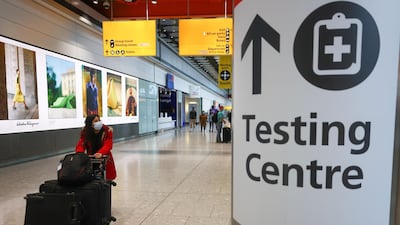Travel between the UAE and UK has been banned by the British government.
All non-British travellers from the UAE will be barred from entering the UK from 1pm on Friday, the government announced.
Travellers with British or Irish passports, or residence rights, will be allowed to return, but arrivals after 4am on Friday must isolate at home for 10 days. They will not be forced into hotel quarantine, but will not be eligible to use the "Test to Release" scheme which allows people in England to stop self-isolating with a negative test after day five.
Worries about the virulent South Africa strain of Covid-19 being spread by visitors from the UAE led the UK to act.
Announcing the ban on Twitter, Transport Secretary Grant Shapps said Burundi and Rwanda were also added to the UK’s "red list".
“[British] passengers must still have proof of a negative test and completed passenger locator form before arrival, or could face a £500 [$687] fine for each,” Mr Shapps said.
The Department of Transport said: “The decision to ban travel from these destinations follows the discovery of a new coronavirus variant first identified in South Africa, which may have spread to other countries, including the UAE, Burundi and Rwanda.
"Any exemptions usually in place will not apply, including for business travel.
“British nationals currently in the UAE should make use of the commercial options available if they wish to return to the UK.
"Indirect commercial routes that will enable British and Irish nationals and residents to return to the UK continue to operate.”
In response, the UAE said British travellers affected by the decision would have their visit visas extended free of charge.
State media Wam reported the UAE would "maintain its role as an important travel and logistics hub while adhering to the highest standards of health and safety."
The UK government's decision comes a day after it announced a list of countries from which travellers would have to use British "quarantine hotels" for 10 days.
Thirty high-risk countries were listed after increased fears over Covid variants from countries such as Portugal, South America, and large parts of Africa.
The UAE was left off that list despite speculation that it would be included.
But it is understood that the British government was concerned about the UAE’s status as an international transit centre with people flying from South Africa through the Emirates into Britain to escape the travel ban.
According to flight data company Cirium, there have been 159 flights from the UAE to the UK in the past 10 days.
In the past week it was announced that 77 people in Britain had the South African strain, which is more transmissible than original coronavirus and thought to lead to be more deadly.
There is also some concern that British holidaymakers – including Instagram "influencers" – have travelled to the UAE for winter sun, and that some could be carrying the virus.
Since January 1 the number of cases in UAE has risen by 80,000 to 289,000.
The British Home Secretary, Priti Patel, this week launched a scathing attack on influencers for “showing off in sunny parts of the world”.
Ms Patel said that travellers would be stopped from leaving the UK if their journey was not essential.
John Martin St Valery, chairman of the British Business Group in Dubai, told The National: "Regrettably, the behaviour of some visitors over the past few weeks, and the flouting of regulations, has made tourists unpopular.
“Clearly, this is not good news for the UAE’s travel and hospitality industry but we must continue to do all we can as a collective to try and drive case numbers down and avoid further variant strains coming to the UAE."
But with both countries in the top three in the world for their swift vaccination programmes, it is expected that once herd immunity is established, British travellers could soon be allowed back into the UAE.
The latest figures show that the UAE has vaccinated 28 people in every 100, and the UK almost 12 out of 100.
It is also understood that both countries are considering vaccination passports, allowing for ease of travel between them for those who have been inoculated.
“The positive news, as with the UK, is that vaccination numbers are climbing daily and that the rollout of the vaccine continues at pace and, we hope, starts to have an impact,” Mr Martin St. Valery said.
Saj Ahmad, chief analyst at Strategic Aero Research, said the outlook for the travel and hospitality remains grim.
“Any semblance of normality, you can kiss that goodbye until 2022, frankly," Mr Ahmad said.
"The high death rate in the UK, coupled with restrictions that may not be lifted until Easter, alongside the government openly saying people shouldn’t be booking holidays means that the upcoming summer period may end up being a damp squib in terms of numbers, too.
"While vaccinations are invariably going to help and change the landscape, the reality is that until the entire globe is vaccinated, normality simply is not going to make an entrance in 2021 at all.”
This month the rules for travellers leaving the UAE for Britain were tightened, with passengers required to have a negative Covid test up to 72 hours before departure.
Previously the UAE, along with Saudi Arabia, Bahrain, Israel and Qatar, had been among more than 50 nations exempt from having travellers tested or having to isolate themselves for 10 days after arriving in the UK.
The introduction of the corridors allowed thousands to take breaks outside the UK over the Christmas and New Year period.
While the UK has vaccinated more than seven million people, it has registered 103,000 deaths and more than 3.7 million infections.
On Thursday, it recorded another 1,239 deaths of people who had a positive Covid-19 test within 28 days, down from 1,725 the day before.
It reported 28,680 more cases of the disease, a rise of daily infections from a day earlier.
















